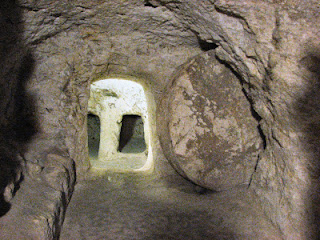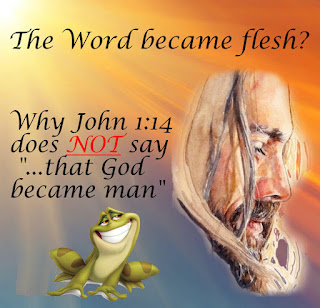Some Comments on the recent discussion by Dr. Dale Tuggy and Carlos Xavier on the Socinian view of John's Prologue
I listened to a recent discussion between
Carlos Xavier and Dale Tuggy on the Socinian view of John 1:1-14. I enjoyed
the discussion, learned some things, agreed with some things, but thought the
analysis’ “mild” rejection of the Socinian view was lacking in a number of
ways. Since I’ve somewhat recently written and podcasted on John’s Prologue,
and have a couple more sessions God willing forth-coming, I thought to note a
few comments:
1.
Dale and Carlos too easily
dismissed or ignored the use of “the beginning” in other places in John, in the
Johannine epistles, and in the Book of Revelation in which “the beginning” is associated
with the person and ministry of Jesus, (in John’s Gospel and Epistles, “the beginning”
never relates to the Genesis creation. In Revelation 3:14, Jesus is “the
beginning of God's creation”). They also ignored the parallel “beginning” of
the other Gospels (or in Matthew’s case, the genesis of Jesus), and the use of “the
beginning” and “in the beginning” in other New Testament books. For a catalog of
some of these references to “the beginning”, see here:
https://landandbible.blogspot.com/2020/02/john-11-beginning-of-gods-new-creation.html
https://landandbible.blogspot.com/2020/02/john-11-beginning-of-gods-new-creation.html
2.
They didn’t relate to one
of the main points of the Racovian Catechism, that is, the literary context of
the Introduction/Prologue. John’s Prologue is not introducing an account of the
creation of rocks, trees and planets, but is introducing the ministry of Jesus
the Messiah. Quoting the Catechism: “In the cited passage where in the Word is
said to have been in the beginning, there is no reference to an antecedent
eternity… But the word beginning… is to be understood of the subject matter
under consideration…” To counter the literary context noted in the Catechism, Dale
and Carlos (and others) should explain how and why John wants to introduce the
ministry of the Messiah (the topic of his Gospel) but in the first 13 verses
(or is it 9?, see below) offers a description of the creation of the universe.
3.
Dale and Carlos don’t agree
where the ministry of Jesus starts in John’s Prologue. At one point Dale says
in 1:14 (“the word became/was flesh”), but then later contradicted himself and
said that 1:11 related to Jesus (“he came to his own”). Carlos apparently thinks
Jesus ministry starts in 1:10, “He was in the world”. Apparently Dale thinks “He
was in the world” is an abstract reference to the word being in the world in different
ways before Jesus? Not sure. That the two can’t agree on where the ministry of
Jesus starts in John’s Prologue is a sign that something is amiss in their
interpretation.
4.
Dale says that the Prologue
is chronological, but then goes on to describe a totally non-chronological
sequence. John the Baptist, who is associated with the beginning of the ministry
of Jesus, apparently interrupts the prologue’s description of the creation of
rocks, trees and animals.
5.
Carlos’ and Dale’s interpretation
of the prologue also ignored the clear parallels in the prologue to other
verses in the Gospel of John which describe Jesus with the exact same language
as the prologue. For example:
John 1:4-5: In him was life, and the life was the light of men. The light shines in the darkness, and the darkness has not overcome it.
John 1:8-9 He was not the light, but came to bear witness to the light. 9 The true light that enlightens every man was coming into the world.
John 3:19 And this is the judgment, that the light has come into the world, and men loved darkness rather than light, because their deeds were evil.
John 8:12 Again Jesus spoke to them, saying, "I am the light of the world; he who follows me will not walk in darkness, but will have the light of life."
John 9:5 As long as I am in the world, I am the light of the world."
John 12:46 I have come as light into the world, that whoever believes in me may not remain in darkness (cf. 12:35, 3:20)
If I’m a Trinitarian (or a binitarian), and somebody tried to tell me that Jesus is not the light and life in the world of John’s prologue, I think I’d tell them to go memorize John 3:19, 8:12, 9:5, and 12:46.
There were other inconsistencies and
difficulties with the presentation, but my comments are already long. Again, I’m
glad One God believers are discussing this topic. I hope that eventually more
and more One God believers will come to see that while John’s introduction intentionally
echoes Genesis creation language, John is doing so because he is introducing
the new life that God is bringing about through Jesus the Messiah.



Comments
It's easy for me to read verse 1 and find problems with the trinitarian interpretation. I'm pretty sure John wasn't saying what many Christians assume he was saying. But I still have the question, "What, then, WAS John saying?" It's obviously important to understand what the individual verses mean. But I think it's nearly as important to tie them altogether. I don't think (nor do I think YOU think) that these verses are individual pearls on a necklace — like some of the verses in the book of Proverbs — that can be read and understood apart from the other verses in the context.
You and others have made valid points about how John uses similar language elsewhere, and I really like where you are going with that. I'll be looking forward to your future and expanded thoughts on this.
I'll be posting a short video soon but for now a few points:
1. The phrase "in the beginning" (en arche) is verbatim the LXX of Gen 1.1 and Prov. 8:22-23. John never uses the phrase in reference to the beginning (arche) of the ministry of Jesus.
2. That's a very good question. Maybe it has to do with the very Jewish idea of the ideal/notional preexistence of the Messiah, i.e., his primacy over all other prophets like the Baptist. Therefore, the Messiah is the fulcrum of creation itself, as later told to us in Heb 1; 1Cor 8:4-6 etc.
And I don't know what the Socinians meant by "there is no reference to an antecedent eternity." By definition the word of the Lord is eternal in the OT.
3. You're right, I do not agree that v.14 is a reference to the beginning of the ministry but simply a reference to the virgin birth (the singular reading by the Church Fathers of John 1:13 was right I believe). And yes, the grammar seems to show a purposeful change from the word/light as an "it/he" (autou) to a "him (auton) in v.10. Regardless, the beginning of the ministry of Jesus proper clearly begins only at v.19.
4. I agree with you that the prologue is not necessarily chronological. It is after all written in a very typical Jewish Wisdom literature style, i.e., poetic prose. Obviously the Baptist is introduced in the midst of it after v.5. Which would not make sense if John is describing the beginning of the ministry of Jesus. In other words, why would the Apostle introduce the ministry of the Baptist after (and not before) the ministry of Jesus? This clearly interrupts the Socinian interpretation of the prologue.
5. Like your point 1 just because John sometimes uses the word “beginning” (arche) for the ministry of Jesus doesn’t mean it’s the same as John 1:1. It's actually not even the same phrase (en arche).
Lastly, it’s hard to ignore the clear, almost verbatim parallels between Gen 1 and John 1 like:
* LXX Gen 1.3 “Let there be” (egeneto) and John 1:10 "came into being" (egeneto) in reference to the “world” (kosmos);
* John 1:5 “the light (phos) that shines in the darkness” and LXX Gen 1.4 God separates “the light from the darkness”;
* The phrase “all things” a reference to the Genesis creation elsewhere: Eph. 3.9; Rom 11.36; Heb. 3.4; Rev 5.13; which explains the use by John of the divine passive in vv. 3-4, 10: i.e., “All things were created” (by God).
The fundamental mistake by the Socinians was to buy into the belief that "the word of God" is a separate person apart from God. This led to a new reading of John 1 that had never been tried before. So always be wary of the shiny new ball ;)
In any case, I have a few comments on your points:
2) where do you find "notional preexistence" ANYWHERE in the Bible? The closest I think you can get is, "before I formed you in the womb...I appointed you a prophet to the nations". That works fine with the idea of Jesus being chosen before the foundation of the world, but how does that transfer over to Jesus being depicted as a character present before his existence?
5) the difference between arche and en arche can be as simple as syntactical usage. It can be like when people make a big deal about ho being before theos in some cases, where ho theos is not meant to be a specific phrase, but that each part has its grammatical purpose.
6) your way of having the light of day in Genesis be the same thing as the light in John 1 opens you up to having no basis to reject the Trinitarian way of reimagining the "word" of Genesis 1 as a person. John itself opens the door to this by making Jesus be the light of the world only while he is in the world. It's not damning, but I just hope that you understand the consequences.
1. It doesn't matter if EN ARXH in John 1:1 is "verbatim" from Genesis 1:1 because it also "verbatim" for a couple dozen other passages in both the OT and the NT that have nothing to do with the Genesis creation. If you claim it is "verbatim" of Genesis 1 and Proverbs 8, then why not Ruth 1:22 or Philippians 4:15?
2. The "Jewish idea of notional preexistence" is not a biblical concept. If you have to appeal to something like this, then you're going in the wrong direction to start.
3. Appealing to an obscure interpretation of John 1:13 to claim that John 1:14 is about "the virgin birth" is another bad approach. Why do you criticize Trinitarians for selectively appealing to a certain reading of John 1:18 "only-begotten God" from the church fathers when you rely on the same thing?
4. Claiming that the Prologue is "written in typical Jewish Wisdom literature" or "peotic prose" is nonsense. You can't prove that, and it's a fallacy to think that "genre" affects meaning. The writer of the "John" books doesn't even use any of the Greek terms for "wisdom."
5. It's a mistake to think that "the same phrase" has to be used for "the beginning" to have the same reference or meaning. For example, when Peter said "from the beginning" (AP ARXHS) in 2 Peter 3:4 he was referring to the same "in the beginning" (EN ARHX) in Genesis 1:1. Thus, the same can be true with passages like John 1:1 and John 15:27 where different expressions for "the beginning" are used.
6. It's naive to point out a few supposed "parallels" between Genesis 1:1-3 and the Prologue when there are far more obvious differences. For example, where are heavens, earth, seas, waters, day, night, or created found anywhere in the Prologue?